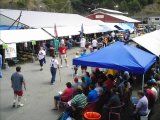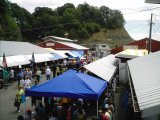 |
 |
 |
| Crowds. See My Day at the 2008 Remote Area Medical (RAM) Click on any picture above for a larger image. |
||
|---|---|---|
What Remote Area Medical contends with in Southwest Virginia
by Lewis Loflin
The Remote Area Medical (RAM) Project in Wise County VA, is a joint service project by the Lions of Virginia and the Remote Area Medical Volunteer Corps from Knoxville TN. The following are viewpoints come from a state agency, a local businessman, and a Christian aid group in Bristol, Virginia. One blames the sick, another offers no solution, the third does what they can. These views reflect the political divide in this region and why so little ever comes from government programs.
It's mostly their fault
This is an extract from Speak Your Piece: Time to Educate the Coalfields Out of Poverty, Disease. Frank Kilgore is an attorney in St. Paul, Virginia.
Improved roads and public schools, high-speed Internet, public water and sewer access, enhanced mine safety and reclamation and pro-active economic development are all very important and have been belatedly pursued with diligence and a new sense of urgency.
Despite these gains, our region's health care statistics are still shameful, and the images of the huge crowds at annual Remote Area Medical (RAM) health care events in the Virginia communities of Wise and Grundy are not acceptable in one of the richest states of the world's richest nation...Rather, the state of the region's poor health statistics has many causes, most of them preventable. Coalfield residents, more than almost any other national sub-group, eat too much of the wrong foods, fail to exercise and go about abusing drugs, alcohol and tobacco at alarming rates.
For example, adults in Central Appalachia use tobacco at three times the national average, many times purchasing that high-priced deadly commodity instead of buying fruits and vegetables or dental care for their kids. Pregnant Appalachian women smoke at the nation's highest rate and too often consume alcohol and drugs to the detriment of their unborn children. It will take a mixture of increased help from the outside and self-discipline, education and action from within to resolve these issues.
Education in the coalfields is the answer to many of these woes. Preventive health care is a must and those efforts have to start early in our public schools. This will take a combined effort of motivated and role-model physicians, nurses, nutritionists, naturopaths and self-taught health-care advocates to achieve. Reducing fat and calories in school meals, allowing time for recess and exercise and getting tobacco, drugs and alcohol entirely off of school properties are in order.
Holding parents and caretakers more accountable for harming children with second-hand smoke, drug use and alcohol abuse would be a good start as well...It is clear that many parents and guardians will not or cannot guide their children properly regarding these life-and-death issues of good health and appropriate lifestyles.
Once again, it is the public and private education system and enlightened churches that will need to step up these efforts. We cannot allow another generation of coalfield youth to become national poster children for bad choices. The state governments of Virginia, Tennessee, Kentucky and West Virginia and federal agencies must make health education and preventive health care priorities in the coalfields and other under-served areas. Thousands of lives and billions of taxpayer dollars in treatment expenses hang in the balance.
Original URL http://www.dailyyonder.com/speak-your-piece-time-educate-coalfields-out-poverty-disease-0
First a few issues here need to be clarified. He is correct about issues such as smoking, alcohol abuse, etc. My wife and I recently went to one of Bristol's little outdoor concerts. At least three out of four people we observed there were smokers, and not just one cigarette, but one after the other. Many of those in addition were overweight. This cut across young and old, while most of the crowd was over 40. We know people everyday that put beer and smoking over food or paying bills. This does need to be addressed.
But his other comment, "Improved roads and public schools, high-speed Internet, public water and sewer access" etc. also needs to be addressed. These massive government projects provide little or no real opportunity for the typical resident. They present good jobs for government employees and lucrative contracts for the politically connected, but little in real jobs that pay a living wage or has any benefits. Not only must residents start being responsible for their health and avoid bad habits, but they must learn self-sufficiency and stop penning their hopes on government.
It isn't just education alone, it's reality they must deal with. What Mr. Kilgore is talking about is a middle-class lifestyle for the typical citizen, something that just isn't going to happen with present government programs and the local politicians that undermine them.
Some demographics from University of Virginia at Wise annual report 2007:
The GMEC service area covers 5,995 square miles of rugged, rural, ridge and valley landscape with a population of about 400,000. As a group, people who reside in the GMEC service area are significantly less healthy than people in the Commonwealth as a whole. The age-adjusted death rate in Southwest Virginia is 19% higher than the age-adjusted death rate for Virginia overall. The disability rate in the GMEC area is 70% higher than in Virginia. Premature death and disability haunt Southwest Virginia, but elevated death rates among adults of working age are particularly disturbing.
Death rates from many common causes are much higher in Southwest Virginia than in Virginia overall. People in the GMEC service area are:
23% more likely to die from heart disease
44% more likely to die from chronic obstructive pulmonary disease
41% more likely to die from pneumonia or influenza
30% more likely to die from diabetes
54% more likely to die from chronic liver disease
70% more likely to die from unintentional injuries and
70% more likely to commit suicide. (In fact the region has among the highest suicide rates in the state.)
The population of the GMEC service area has hovered around 400,000 since 1940. In 1990, the region's population was 393,310; in 2000, it was 399,318; in 2005, it was estimated as 399,300. The number of deaths from heart disease in our region has decreased significantly...The number of deaths from diabetes has increased alarmingly over the past 15 years...
Southwest Virginia needs more clinicians, but is hard pressed to support them. The area's poverty rate is 75% higher than the Virginia rate (16.8% compared to 9.6%) and per capita income in the region ($15,787) is only 65% of per capita income in Virginia ($23,975). 35% of the people aged 25+ in the GMEC region do not have a high school diploma (Virginia - 18%). Twenty-nine percent of Southwest Virginians between the ages of 21 and 64 are disabled; only 17% of the same age group in Virginia is disabled. (Data source: U.S. Census 2000.
Persistent poverty makes it harder for physicians interested in working in Southwest Virginia to meet their income expectations and adds to the challenge of recruiting and retaining doctors for the area. Poverty is a well known risk factor for ill health. High rates of poverty and chronic disease in Southwest Virginia increase the demand for medical care, but the region has fewer physicians per capita than Virginia as a whole.
And from: http://crossroadsmedicalmission.org a private Christian group.
Southwest Virginia and northeast Tennessee suffer from chronic high unemployment, poverty, and a lack of adequate health insurance. Many people are forced to make difficult choices, such as either buying food or medication, paying for doctor visits or for utility bills. Crossroads Medical Mission is a mobile medical clinic designed to bring primary care to those with poor access to health care for any reason.
CMM is a Christian mission based at State Street United Methodist Church in Bristol, VA. The staff includes two family physicians, a medical assistant, and a mission development coordinator.
Another great private group is (www.healinghandshealthcenter.org) that provides health care for uninsured working people. To quote their website:
Healing Hands Health Center was begun in 1997 after a need was identified for persons who were working, but could not afford basic health care. A small group of devoted individuals decided to see what faith and determination could accomplish.
Healing Hands provides free medical, dental, podiatry, chiropractic, eye care, and pastoral and psychological counseling services to people who otherwise could not afford to access health care. We fill a niche in our community and we do not overlap or duplicate other programs.
- Virginia's rich areas richer; poor get poorer
- Bristol Wal-Mart Controversy
- Study: Thousands of Wal-Mart workers on TennCare
- Illegals boost bottom line at Wal-Mart
- Wal-Mart Raids by U.S. Aimed at Illegal Immigrants
- Cleaner at Wal-Mart Tells of Few Breaks and Low Pay
- Wal-Mart Memo Suggests Ways to Cut Employee Benefit Costs
- Suits Say Wal-Mart Forces Workers to Toil Off the Clock
- Flying with Pork-Barrel Airways
- RAM Project update 2003
- RAM Project Page
- Fun and Games at Eastman Chemical in Kingsport Tennessee
